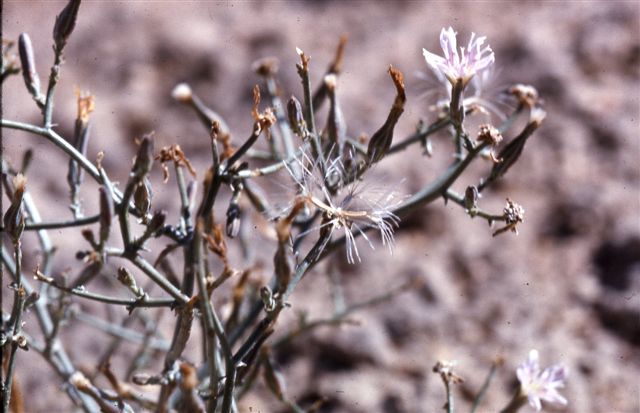Biographical Sketch
Following a Bachelor of Arts degree from Cornell University in 1957, Dr. Leslie David Gottlieb's career began at Oregon State University in the Botany and Plant Pathology Department. He earned a Master's degree in December 1965 with major professor Dr. Kenton Chambers and wrote a thesis on hybridization between species of manzanita in southwestern Oregon . It was in Corvallis that he first learned about plants and how to identify and investigate significant questions in evolutionary biology. His PhD at the University of Michigan in 1969 examined patterns of diversity and mechanisms of speciation in Stephanomeria.
 |
Stephanomeria malheurensis, a Federally listed endangered species known from a single locality in Harney County, Oregon. Discovered by Professor Gottlieb in 1966, he studied the species intensively because it is one of the very few examples of the recent natural origin of a plant species. |
He then joined the faculty of the Department of Genetics (Section of Evolution and Ecology) at the University of California, Davis where he taught classes in genetics and evolutionary biology, and served as department chair for three years during the mid-1980s. Dr. Gottlieb researched a broad array of subjects including plant speciation, polyploidy, biochemical evolution of isozymes, molecular genetics, and the application of biochemical and molecular data to plant systematics. Many of his studies dealt with rare and endangered species, particularly in the genera Clarkia and Stephanomeria.
Dr. Gottlieb published more than 120 research papers and received a number of awards including a John Simon Guggenheim Fellowship (1975), and Fellowship of the American Association for the Advancement of Science (1985). In 1993 he was named Alumni Association Fellow of Oregon State University.
The Botanical Society of America awarded its Merit Award, its highest honor, for the year 2000, to Dr. Gottlieb. An announcement in Plant Science Bulletin, the society's newsletter, described Gottlieb as: "one of the most influential plant evolutionary biologists over the past several decades." Award committee chair, University of Wisconsin genetics professor John Doebley, cited three of Gottlieb's publications as classics, including a 1984 article in American Naturalist called "one of the most important papers in plant evolutionary biology during the past half century." In 2006, he received a Centennial Fellow Award from the Botanical Society of America.
His wife, Vera, was granted the Ph.D in Botany from the University of California (Davis). She and Leslie have collaborated on many research projects and have published numerous papers together.
After retiring from UC-Davis in 2004, Leslie and Vera now make their home in southern Oregon.
The Leslie and Vera Gottlieb Research Fund in Plant Evolutionary Biology was established in 2006 to provide funds to graduate students to support both laboratory and field research in the evolutionary biology of plants native to western North America. This is a broad field that includes evolutionary and population genetics, systematics and phylogenetic studies, comparative analyses of development, and physiological and biochemical studies of plant adaptations. The Research Fund will provide an annual award of $5000.
The Research Fund will help many grad students initiate their own careers in science as well as providing new information and new ideas about plant evolution.
Application
For further details please contact Dr. Aaron Liston.
Awardees
Ann Willyard (2006)
Paul Severns (2007)
Stephen Meyers (2008, 2009)